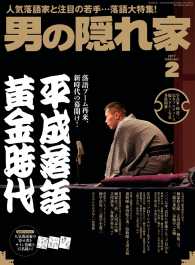- ホーム
- > 洋書
- > 英文書
- > Biography / Autobiography
Full Description
The story of John Wesley's affair with Grace Murray and how Charles Wesley prevented their marriage by persuading Grace to marry John Bennet, who was one of the key Methodist lay preachers, has long fascinated historians, but most have tended to view John as the victim and been hugely critical of the behaviour and actions of the others involved. Grace has been described as 'impetuous, imperious, and probably a little unstable' and as an 'uneducated, vain, fickle, selfish and presuming' flirt, even though this does not tie in with either John Wesley's or John Bennet's view of her. Bennet has been dismissed as 'a cheat' and 'a treacherous, unfriendly man', even though Charles Wesley, George Whitefield and other contemporaries consistently praised his character. Charles has been accused of over-reacting to gossip and acting out of personal reasons. It has been alleged, for example, that he wanted John to remain single so he could retain the income his own wife required, and that both he and his wife were too snobbish to want to have Grace as their sister-in-law.All these accusations have tended to obscure rather than clarify what really happened because they either ignore or do not pay enough attention to the fact that John Wesley was just as much to blame for what happened.Today, after decades of relative historical neglect, Grace Murray is beginning to receive more recognition as 'a strong-willed, capable and dedicated woman worthy of a distinguished place in the annals of early Methodism'. What emerges from this study is a remarkable woman - a pioneer female class leader and preacher, who, throughout her life, had to come to terms not only with the doubts and fears that can beset Christians at times, but also with the prejudices of her day. Dr Johnson represented those well when he quipped: 'A woman preaching is like a dog walking on its hind legs. It is not done well; but you are surprised to find it done at all.' What comes across most strongly in Grace's writings is her acute awareness of her own failings and her abiding faith in the redemptive love of God. When she knew she was approaching death she wrote to her son:'God did wonders for me all my life.I have been astonished and overwhelmed with a sense of his love to me the chief of sinners, the most unfaithful and unprofitable of all his servants.'Her character makes it all the more understandable why John Wesley was hit so hard by her loss and why he struggled to understand why God had not permitted him to marry her:The main outcome of Grace's marriage to John Bennet has usually been portrayed as being John Wesley's disastrous marriage on the rebound to Molly Vazeille, but of far more significance was the divide her loss created between John and Charles. That had huge and important repercussions on the way in which Methodism was subsequently to develop.After the initial trauma was over both John Wesley and Grace Murray came to believe that it was God who had prevented their marriage. In a more secular age, it seems preferable to explain what happened by looking at the actions of people involved and using the evidence available. This book tries to do exactly that and what emerges is a tragedy of errors for which all the protagonists can be held equally responsible.John Wesley, Grace Murray, John Bennet, and Charles Wesley all did what they did for the best, if at times misguided, motives. Whether the hand of God can also be seen in what happened is left to the reader's judgement.







